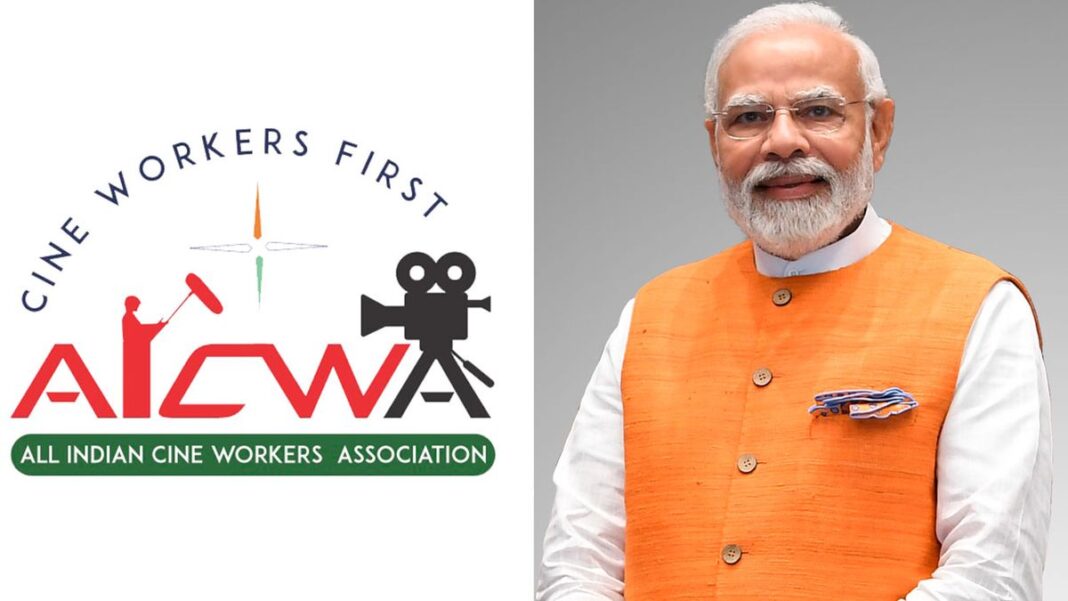Cine Workers Write to PM Narendra Modi About Exploitation
The All Indian Cine Workers Association (AICWA) has taken a bold step by addressing the Prime Minister of India, Mr. Narendra Modi, regarding the exploitation and adverse working conditions faced by individuals in the entertainment industry. Despite being the backbone of the fraternity, these workers often find themselves in challenging situations that impact their livelihood and well-being.
Varun Dhawan shares first glimpse from the sets of Border 2
In a heartfelt letter to the Prime Minister, the AICWA highlighted the pivotal role these workers play in shaping India’s entertainment landscape, contributing significantly to the country’s economy and cultural influence. However, the letter shed light on the harsh reality these workers face, including exploitation, poor working conditions, and a lack of social and economic protections.
Crazy audience response to Rajinikanth’s Jailer 2 teaser; Watch Video—
The letter also brought attention to the specific challenges faced by female workers, such as inadequate changing rooms, night shoots, outdoor shoots, and more. Many female workers have resorted to changing clothes in vehicles, compromising their safety and dignity. Additionally, the AICWA emphasized crucial issues like fire safety and food quality, urging for structural reforms to address these pressing concerns.
Jailer 2 Teaser: Thalaiva Rajinikanth Is Back in Action Mode!
One of the major issues highlighted in the letter was the problem of delayed or non-payment of wages. Despite their hard work and dedication, some workers never receive their rightful wages, leading to financial struggles. The absence of a structured payment mechanism has only worsened their situation, especially post-COVID, with many workers experiencing significant pay cuts, making it challenging to meet basic living expenses.
Stay tuned to Movie Talkies’ website and social media platforms (Facebook, Twitter, Instagram) and YouTube channel for the latest updates, breaking news, spicy gossip, box office collection updates, movie reviews, spotting videos, and interviews from Bollywood, television, OTT, Hollywood, regional industries, and South cinema.
Full Review
A Quick Synopsis
The entertainment industry is a place where dreams come alive, but behind the glitz and glamour lies a harsh reality that many cine workers face. The recent letter addressed to PM Narendra Modi by the AICWA sheds light on the exploitation and challenges faced by these unsung heroes of the industry.
In a heartfelt plea for intervention, the association highlighted the need for structural reforms to improve the working conditions and lives of these workers. Issues ranging from inadequate facilities for female workers to delayed payments and post-COVID pay cuts have been brought to the forefront, urging for meaningful change in the industry.
The detailed review delves into the heart of these pressing issues, examining the impact on the lives of cine workers and the industry as a whole. From the importance of recognizing their contributions to the necessity of implementing reforms, this review explores the multi-faceted challenges faced by those who form the foundation of India’s entertainment sector.
Conclusion
In conclusion, the letter addressed to PM Narendra Modi by the AICWA serves as a wake-up call to the industry and policymakers, urging for meaningful change to ensure the well-being and rights of cine workers. It is a reminder of the resilience and dedication of these individuals who work tirelessly behind the scenes to bring stories to life on the big screen.
Frequently Asked Questions
- What prompted the AICWA to address PM Narendra Modi about exploitation in the entertainment industry?
The AICWA highlighted the adverse working conditions and exploitation faced by cine workers, urging for structural reforms to address these challenges. - What specific issues were mentioned in the letter to PM Narendra Modi?
The letter addressed issues such as inadequate facilities for female workers, delayed payments, post-COVID pay cuts, and the lack of social and economic protections. - How does the AICWA’s letter aim to improve the lives of cine workers?
The letter seeks the Prime Minister’s intervention to implement structural reforms that would not only benefit the workers but also strengthen the industry as a whole. - Why is the delayed payment of wages a significant issue for cine workers?
Many workers never receive their wages, leading to financial struggles. The absence of a structured payment mechanism exacerbates their financial woes. - What impact has COVID-19 had on the wages of cine workers?
Post-COVID, many workers have experienced pay cuts, with some earning half their previous income, making it difficult to meet basic living expenses. - How does the lack of fire safety and food quality impact cine workers?
The absence of proper fire safety measures and poor food quality pose risks to the safety and well-being of workers on sets. - What are some of the challenges faced by female workers in the entertainment industry?
Female workers often lack adequate changing rooms, leading to compromises in safety and dignity, especially during night or outdoor shoots. - Why is it essential to recognize the contributions of cine workers to the entertainment industry?
Cine workers play a vital role in shaping India’s entertainment landscape, contributing significantly to the country’s economy and cultural influence. - What are some of the key takeaways from the AICWA’s letter to PM Narendra Modi?
The letter emphasizes the need for structural reforms to address exploitation, poor working conditions, and the lack of social and economic protections faced by cine workers. - How can individuals support the cause of cine workers in the entertainment industry?
Individuals can raise awareness about the challenges faced by cine workers, support initiatives for their rights and well-being, and advocate for reforms in the industry.Tags: Cine Workers, Exploitation, AICWA, PM Narendra Modi, Entertainment Industry, Structural Reforms, Female Workers, Wages, Post-COVID, Fire Safety, Food Quality.

